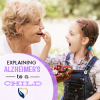Alzheimer’s is the type of disease that affects not just the people diagnosed with it, but their friends, families and loved ones as well. Dementia can be a major challenge for adult children, who may feel scared and confused as they try to navigate this unfamiliar territory, but it can be even harder for young grandchildren or great-grandchildren who are not equipped to cope with such a major, sudden change. Once your elderly loved one starts to show signs of cognitive decline, it’s important to have a family discussion centered on explaining the illness to the kids.
Know how children are affected by dementia
Before you initiate the conversation, it’s important to realize all the ways having a grandparent with dementia affects your children. The U.K. Alzheimer’s Society explains that kids are very receptive to family tension or shifts in home-life, so even if nobody has spoken to them directly about dementia, they’re probably aware that their parents are dealing with some issue. Many times, children emulate the way their parents handle difficult times, so if you’re emanating stress, they’re probably feeling the same way.
Kids living with a grandparent who has Alzheimer’s disease struggle with the concept of trust. The relationship they established with their grandparent seems to be unraveling, and an adult they consider an authoritative, trustworthy rock in their lives is requiring more attention and assistance each day. Uncertainty about the disease and the future with their grandparent will likely be the root of most of your children’s concerns.
Explain Alzheimer’s so kids can understand
Alzheimer’s is a very complex disease, and putting it in simple terms can be very difficult. Caring.com explains that using the word “disease” can be confusing for kids, who may argue that their grandparent doesn’t seem sick, just different. Start the talk by telling your kids that their relative has a “memory problem.
“Equate dementia to something small children can understand.”
Small children may need you to equate dementia to something more accessible that they can fully understand. Caring.com suggests talking about their grandparent’s mind as if it’s a tape recorder. When his or her grandparent was young, their recorder worked very well, but now that they are older, their tape recorder isn’t recording as well. That’s why sometimes he or she forgets things that happened five minutes ago but likes to talk about things that happened long before you were born.
Depending on their emotional maturity, older kids and teenagers are probably ready to hear more serious details. For example, that their grandparent needs to be supervised to prevent him or her from wandering, or that he or she may soon forget their names. They are still children, however, so be sure to explain that this is an issue the adults will be dealing with and that they don’t need to worry or get stressed about it. Simply loving, appreciating and supporting their grandparent during his or her cognitive decline is plenty.
For educational resources geared toward young people, check out the videos and articles provided by the Alzheimer’s Association.

It’s important to explain Alzheimer’s in terms your children will understand.
Prepare for questions
Depending on how much time your children spend with their grandparent or what stage the Alzheimer’s is at, you may have already been fielding questions from them about their relative’s behavioral changes. As you prepare to discuss the disease with them, be ready to speak on a variety of dementia-related topics your children might be wondering about. The Mayo Clinic explains that these are some of the most common questions kids ask when trying to understand dementia:
- What’s wrong with my grandparent? Children that have picked up on even the slightest changes in their loved ones will want to know what’s going on.
- Will this happen to my parents/siblings/me? Explain to kids that the disease isn’t contagious. Tell older kids who may understand the hereditary elements of dementia that one family member receiving this diagnosis doesn’t mean everyone in the family will eventually develop cognitive issues.
- Does my grandparent still love me? If your children’s grandparent has difficulty recognizing them or thinks they are different people, your kids may be dealing with feelings of rejection and confusion. It’s important to tell them that while dementia might cause their relative to get disoriented, they are still a major part of their grandparent’s lives.
- Is this my fault? When cognitive decline starts, your kids may notice their grandparents becoming more irritable or having severe mood swings. Dementia may cause your loved one to blame misplaced items or complete accidents on you and your children, so simply assure your kids they’ve done nothing wrong and that their grandparent is confused from the disease.
- What’s going to happen in the future? Most kids think of illnesses as problems that can be fixed, so it’s important to be clear about the permanency of Alzheimer’s. Let them know that routines surrounding their grandparent will likely continue to change as the disease evolves, but their support is more important than ever as they continue through the changes together.
If you found an error, highlight it and press Shift + Enter or click here to inform us.



